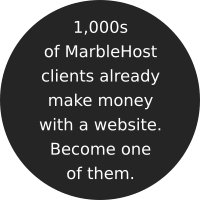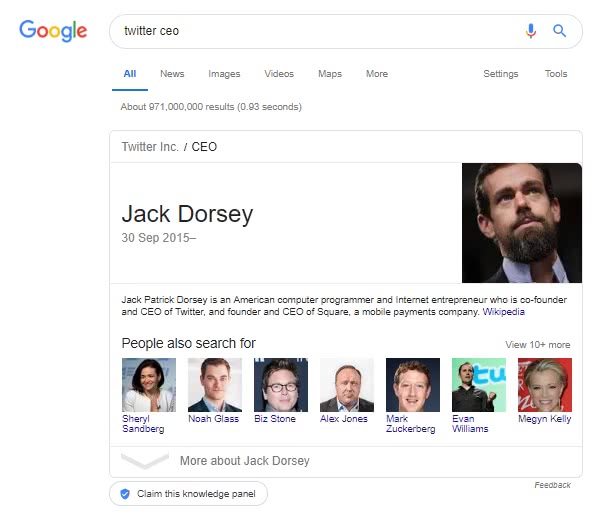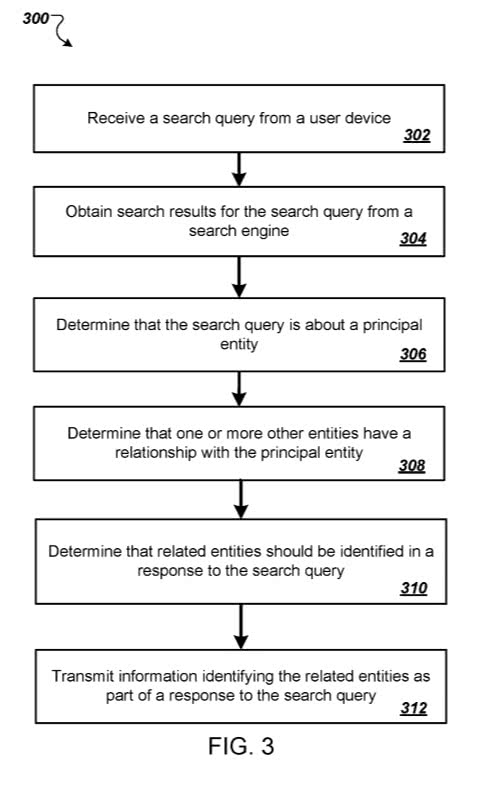Start a profitable website or blog
Free email course
by the MarbleHost Academy.
What are related entities and how can they help my business SEO?
Today I’d like to touch base with you regarding Google’s patented Related Entities. The Related Entitles patent was filed in February 2018 and is another search based algorithm that provides information about a key person or topic, as well as providing information that is related to it.
For example, if you were to type in a search for “CEO of Twitter”, the first result would be a picture and description of Jack Dorsey. Under this information, you can also find related search results for similar people. In the example of Jack Dorsey, you would find information about Sheryl Sandberg, Noah Glass and so on. What Google's doing is predicting that if a person is searching for a CEO of a social media company, they may also be interested in information about CEOs of similar companies.
The interesting part in all of this is that as a business person working in technology, I can understand how Jack and Sheryl might be related (Jack being the CEO of Twitter and Sheryl being the COO of Facebook), but how does Google search come to confidently bring up these results as related entitles given that they are completely different people, operating in different companies, etc.They may never have even worked together, and they aren’t related by blood. So how does Google manage to create a link between them that is accurate?
Google search now includes its magical (and patented) Related Entities to create the connections between one entity and another through the associations that one search term may have with another. A breakdown of the commands that provide the results is in this flowchart:
Related Entities: Three Points To Consider
The first aspect of the search is whether related words which are often found or linked with other terms. For example, Jack and Sheryl are both CEO’s, so the search algorithm would pair Jack and Sheryl under the high profile company management umbrella as they are often mentioned with the related term of CEO.
The second point includes whether the names occur within the same articles. For example, if two names are often mentioned together, (ie Jack and Sheryl), Google will see they can safely link the two. A key factor in linking these two people as related entities comes from whether the source that has linked them together is perceived by Google as reputable.
In this example, the longevity and trustworthiness of the source sites that mention them (possibly multiple times) are both extremely important factors in Google’s Related Entities’ algorithm joining them together for the purposes of serving the results. The significant authority of the site that holds articles where both people will be mentioned is vital. For example, the authority and trustworthiness of certain news sites, such as the Huffington Post, will prioritise the Related Entities over a newly created blog. Therefore, if many high authority sites mention the two entities, the stronger the connection and the Google Related Entities patent will provide these results together.
The third and most exciting facet of this patent reveals that Google has a separate entity database. This would be one place where its definitive job would be to identify and link separate entities and find out how they are related. This database allows Google to increase its understanding of everything on the web and how they are connected; how strong these connections are and what they are related to.
Related Entities: Possible Opportunity?
So what does this mean for us? Basically, this gives SEOs extremely powerful insights as to how to strengthen associations between a brand and Related Entity. If you’re smart about it, you can use entity association in addition to your link building to actually boost your rankings.
If you perform a Google search, currently the Related Entities tend to be related to people rather than things, however, it is not difficult to see that with this algorithm finding accurate associations, that brands, locations, and markets can be easily linked.
The ultimate goal of Google’s Related Entities patent is to accurately transmit information identifying the Related Entities as part of a response to a search query. The patent outlines four key areas including:
- Obtaining data to identify a particular entity and its type: For example, if you have a company that sells a particular brand, the location of the brand and your own company’s site will over time become Related Entities, providing that there is reputable and authoritative links between the two entities. Unsure on how to identify keyword opportunities? Here are some free tools to find keywords.
- Identify other entities of the particular type that are related to the particular entity: So if your brand is also related to a product, then this created a link that will be registered by the Google Related Entities patent.
- Order the Related Entities:Depending on the location of the user, the frequency with which particular brands and their products are linked in authoritative site discussions, the reliability of the connection is increased.
- Associate the Related Entities with the particular entity in an index: These Related Entities are then logged as an index which allows for fast and accurate creation of the search results.
Related Entities and SEO
The quest for any website owner is to provide quality content that benefits the reader, which in turn benefits SEO. Good SEO is something that improves with time, and with Related Entities, we now have another tool in which to assist websites to gain recognition, website visits and engagement. I hope this information has been helpful to you.
Join MarbleHost Academy
Discover how to create a profitable website or a blog.
Join our free email course and start making money right now.





 Harry S
Harry S


















